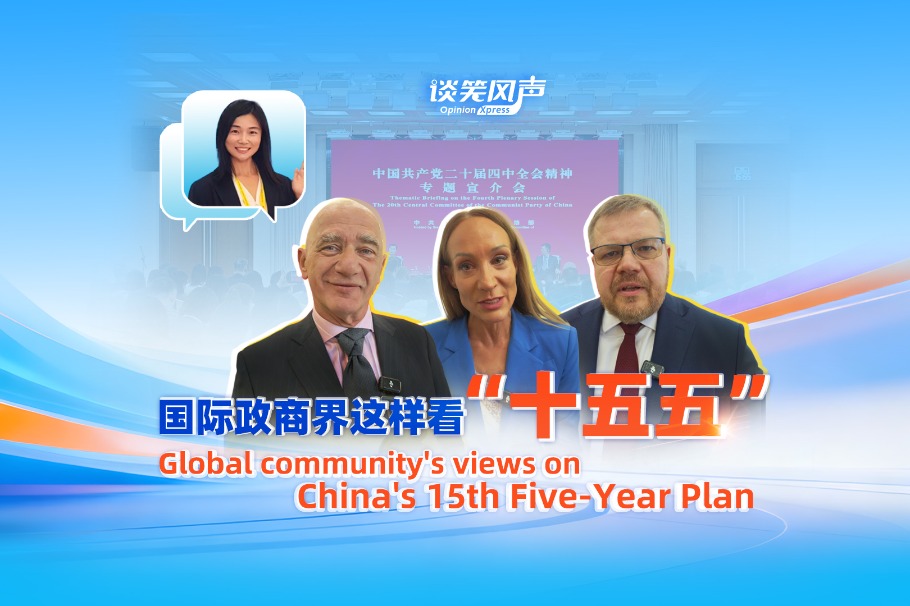Quest to be part of world trade

| The Chinese delegation members toast for China's accession to the WTO on Nov 11, 2001. Xinhua |
During difficult negotiations over 15 years, China never wavered in its quest to join the WTO, Ding Qingfen reports.
After 10 years of China's membership of the World Trade Organization (WTO), many Chinese still commemorate Nov 10, 2001, when the organization formally approved China's entry into the global trade body.
However, for the Chinese officials who participated in the arduous marathon of negotiations, Sept 17, 2001, is no less significant. On that day, after 15 long years of talks, the WTO eventually concluded negotiations on China's bid for membership.
"Today is a memorable day," said Long Yongtu, former deputy minister of foreign trade and economic cooperation, and the head of the Chinese delegation, at a conclusion speech during the 18th session of the Working Party on China on that fateful September day.
"To achieve this goal (membership), we have made protracted and arduous efforts. Everybody present today has good reasons to be proud of our work," Long said.
During the 15 years of seesawing talks on entry to the WTO of the world's most populous nation, Long witnessed and participated in most of the arguments and quarrels.
Commenting on the approval of China's bid, then WTO director-general Mike Moore said: "International economic cooperation has brought about this defining moment in the history of the multilateral trading system. With China's membership, the WTO will take a major step toward becoming a truly world organization."
What China has achieved and created for the world over the past decade has confirmed the significance of China's accession and commitment to the WTO.
In 2000, China was the seventh-largest exporter and eighth largest importer in the world. Nine years later, it became the largest exporter in the world, and by 2010 had become the second-largest importer. Without the negotiations, the benefits to China and the world would not have eventuated.
Wish to return
In early 1948, China was one of 23 signatories to the General Agreement on Tariffs and Trade (GATT). However, upon the founding of the People's Republic of China in 1949, the region of Taiwan announced that China would leave the GATT in March 1950, even though it didn't have the right to do so. The Chinese government has never recognized this announcement.
About 40 years later, China notified the GATT of its wish to resume its status as a full contracting party in 1986.
"China's wish to resume its status was a major part of the opening-up policy that China had adopted to get involved in the world economy," said Li Zhongzhou, a member of the Chinese delegation to the WTO negotiations, and also a former official with the Ministry of Foreign Trade and Economic Cooperation, which later became the Ministry of Commerce.
"Being a member of an organization characterized by unconditional preferential policies among its members would enable China to allocate its resources in the most reasonable way."
China's application for admission to the WTO was guided by a Working Party whose members included all interested member governments.
In 1989, after more than 10 rounds of negotiations, Chinese delegates had made remarkable progress. In April that year, China and the Working Party started discussing the conditions for China's return to membership of the GATT. Unfortunately, progress was delayed. In early 1990, Taiwan requested accession as a separate customs territory.
Through much negotiation, the chairman of the GATT's Council announced in September 1992 that all contracting parties had acknowledged that Chinese Taipei, as a separate customs territory, should not accede to the GATT before the People's Republic of China.
Talks with the US were a major part of the negotiations for China's entry into the WTO, a marathon marked by many hurdles.
"The early stage of the negotiations centered on market access and intellectual property rights, for which I was a witness," said Tong Zhiguang, then deputy minister of foreign trade and economic cooperation and second head of the Chinese delegation to the WTO negotiations.
Tong was so frustrated with the troubled negotiations from 1991 to 1993, that he finally came down with pneumonia.
In October 1992, China and the US signed a memorandum on China's market access, and the US said it firmly supported China joining the GATT. This paved the way for China's resuming its status in the organization.
Joining WTO
"From 1993 to 1994, China felt a strong imperative to resume its status in the GATT before the establishment of the WTO. But we encountered quite a few problems in 1994," Tong said.
At the end of the Uruguay Round - the eighth round of multilateral trade negotiations conducted within the framework of the GATT that started in 1986 - the contracting parties proposed to transform the GATT into the WTO, which would come into effect in January 1995. Under the agreements, all the contracting parties could become WTO members.
From January to August 1994, China made and revised many rules and regulations on currency, import and export quotas, and reduced import tariffs by an average of 35.9 percent.
It was Gu Yongjiang, former deputy minister of foreign trade and economic cooperation, who headed the Chinese delegation in 1994. But he said from the first day he took over the post he never thought it would be easy to successfully complete the job.
Just as Gu took the job, some US senators asked then US president Bill Clinton to link human rights issues with China's WTO accession and its most preferential status, which many experts dismissed as "making no sense".
The US representatives also said it wasn't necessary to set a deadline for China to join the GATT.
"It was such a tough year," Gu recalled.
China's perseverance in pursuit of the status and unremitting efforts eventually paid off. The nation became an observer of the WTO in June 1995, which marked a strategic turning point for China's bid to join the organization.
In the following seven years, China wrapped up negotiations with a wide range of nations and regions, including the US, the European Union, India and Brazil.
"I cannot find any word other than 'hard' to describe the 15-year talks," Tong said.
"It was so hard because China had its own principles and never gave them up in the negotiations. They were: The WTO needed China; China was a developing nation and therefore should enjoy preferential treatment.
"China finally made everyone recognize what China believed when the nation made it (entered the WTO)."

(China Daily 12/09/2011 page27)
Today's Top News
- CPC holds symposium to commemorate 110th birth anniversary of Hu Yaobang
- Economy seen on steady track
- Trade-in program likely to continue next year
- Li: SCO can play bigger role in governance
- Huangyan Island protection lifeline for coral ecosystem
- Latin America urgently needs green credit































